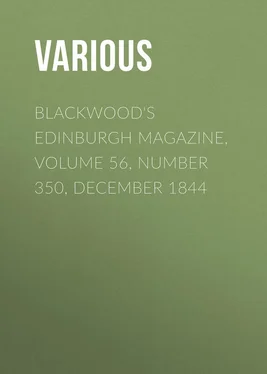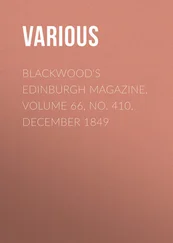Various - Blackwood's Edinburgh Magazine, Volume 56, Number 350, December 1844
Здесь есть возможность читать онлайн «Various - Blackwood's Edinburgh Magazine, Volume 56, Number 350, December 1844» — ознакомительный отрывок электронной книги совершенно бесплатно, а после прочтения отрывка купить полную версию. В некоторых случаях можно слушать аудио, скачать через торрент в формате fb2 и присутствует краткое содержание. Издательство: Иностранный паблик, Жанр: periodic, foreign_edu, Путешествия и география, на английском языке. Описание произведения, (предисловие) а так же отзывы посетителей доступны на портале библиотеки ЛибКат.
- Название:Blackwood's Edinburgh Magazine, Volume 56, Number 350, December 1844
- Автор:
- Издательство:Иностранный паблик
- Жанр:
- Год:неизвестен
- ISBN:нет данных
- Рейтинг книги:4 / 5. Голосов: 1
-
Избранное:Добавить в избранное
- Отзывы:
-
Ваша оценка:
- 80
- 1
- 2
- 3
- 4
- 5
Blackwood's Edinburgh Magazine, Volume 56, Number 350, December 1844: краткое содержание, описание и аннотация
Предлагаем к чтению аннотацию, описание, краткое содержание или предисловие (зависит от того, что написал сам автор книги «Blackwood's Edinburgh Magazine, Volume 56, Number 350, December 1844»). Если вы не нашли необходимую информацию о книге — напишите в комментариях, мы постараемся отыскать её.
Blackwood's Edinburgh Magazine, Volume 56, Number 350, December 1844 — читать онлайн ознакомительный отрывок
Ниже представлен текст книги, разбитый по страницам. Система сохранения места последней прочитанной страницы, позволяет с удобством читать онлайн бесплатно книгу «Blackwood's Edinburgh Magazine, Volume 56, Number 350, December 1844», без необходимости каждый раз заново искать на чём Вы остановились. Поставьте закладку, и сможете в любой момент перейти на страницу, на которой закончили чтение.
Интервал:
Закладка:
In the first place, he would receive no interest upon his deposit account. This point we have already touched upon, when proving that the banks would sustain great loss by the inevitable withdrawal of their deposits; but of course the profit to the bank is one thing, and the profit to the customer is another. An operating deposit account on which a fixed and universal rate of interest is paid, is a thing unknown in England. In that country, according to Mr John Gladstone, a Liverpool merchant, and a declared enemy to the Scottish currency, the bankers only give interest on deposits by special bargain, according to the length of time that these deposits shall be entrusted to their hands. This is clearly neither more nor less than permanent loan to the bank, and, like every other private contract, is arbitrary. But an operating deposit is a totally different matter, by which the circulation of the bank paper is promoted, and which acquires actual value from the frequency of its fluctuations. It is a system so easy in its working, that no householder in Scotland is without it; and for every shilling that he deposits in the bank, he receives regular interest, calculated from day to day, without any deduction or commission, at as high a rate as if he had left, for a stipulated period, a million of money unrecallable by him, to be employed in its trade by the bank. This is surely a great accommodation and encouragement to the trader. But see how the introduction of the metallic currency would affect us. Operating deposits there would be none; for, if the banker were not actually compelled to charge a certain per centage of commission, he would at least be able to pay no interest. Or let it be granted that, by great economy, (though we cannot well see how,) he could still afford to pay a diminished rate, the proportion would be too small to tempt the dealer to the constant system of deposit which now exists, and hoarding would be the inevitable result. Or suppose that the system of deposit should still continue in the large towns, what is to become of the country when the branch banks shall have been removed? A little topography might here be valuable, to correct the notions of the theorists, who would legislate precisely for the thinly inhabited districts of Kintail and Edderachylis, as they would for the town-covered surface of Lancashire.
But there would be more important losses to the public than the mere cessation of interest upon operating deposit accounts. All the witnesses who have been examined, agree that cash-credits must be immediately withdrawn. Of all the facilities that a mercantile country, or rather the foremost mercantile system of a country, can afford to industry, that of cash-credit is certainly the most unexceptionable. Take the case of a young man just about to start in business, whose connexion, habits, and education, are such as to give every possible augury for his future success. The res angustæ domi are probably hard upon him. He has no patrimony; his friends, though in fair credit, are not capitalists; and he has not of himself the opportunity of launching into trade, for the want of that one talent, which, if judiciously used, would in time multiply itself into ten. He cannot ask his friends to assist him in the discount of bills. Large as the affection of a Scotchman may be for some descriptions of paper, he has a kind of inherent repugnance to that sort of floating private currency, which in three or in six months is sure to return, coupled with an awkward protest, to his door. Probably in his own early experience, or in the days of his father, he has received a salutary lesson, better than a thousand treatises upon the law and practice of acceptance; and accordingly, while he will lend you his purse with readiness, he will not, for almost any consideration, subscribe his name to a bill. To persons thus situated, the accommodation granted by the bank cash-credits, is the greatest commercial boon that ever was devised; but as the committee of the House of Lords, in the report already quoted, has borne ample testimony in their favour, it is unnecessary for us to dwell with further minuteness on their utility.
We must again have recourse to Mr Thomson for an exposition of the reasons which, if a metallic currency were forced upon us, would lead to the discontinuance of the cash-credits. "I do not think the cash-credits would be maintained at all; the banker's profits might be made up by the charge of a commission on each credit; but it is not probable that the holders of accounts would pay at such a rate, if they could borrow money upon bills at a cheaper rate, which they would do. They would discount bills at five per cent. A banker would not be disposed to come under the obligation to give a running credit with a cash account, and thereby bind himself to keep in his hands a stock of gold to supply the daily operations of a cash-account, while he might find it perfectly convenient to discount a bill and give the money away at once." In short, it has been stated, and distinctly proved, that the difference to the trader between an operating cash-credit and accommodation by discount, is the difference between paying five and a quarter by discount, and two and a half per cent by cash-credit . Are our merchants and traders prepared or disposed to submit to such a sacrifice; more especially when it is considered, that a bank will often refuse to discount a bill for £100, when it would make no difficulty, from its opportunities of control, in granting a cash-credit for five times that amount?
If individuals are thus to be crippled, the general commercial business of the country must retrograde as a matter of course. Still Edinburgh, and Glasgow, and the larger towns might, although they would suffer immensely, get over the crisis by adopting some system of internal arrangement, without experiencing a general crash. The great question, however, yet remains behind – What is to become of the country districts? To us who are familiar with almost the whole face of Scotland, it seems a gross absurdity to suppose, that under any circumstances , if the branch banks were withdrawn, a gold metallic currency could be made operative in the remoter districts. Mr Dunsmure, then secretary to the commissioners for the public fisheries, gave very singular evidence upon that point in 1826; so singular, indeed, that were it our purpose in this paper rather to amuse than to warn and protest, we should have dwelt more minutely upon his statements. Speaking of the silver currency, his evidence is as follows: – "The quantity of silver on the west coast is so very limited, that there is a great difficulty in getting a proper supply for the necessary purposes. Some of the people have been obliged to issue promissory notes for 5s., long after they had been prohibited by act of Parliament. I happened to be at Barra, and the officer there informed me that, having occasion to purchase some oats for a pony he found it necessary to keep, the farmer whom he paid for them declared he had not seen the face of a shilling for two years before." One of the individuals who was thus forced by necessity to contravene the statute, was a fish-curer and merchant, who kept a large store in Tobermory, and the form of his notes is at once curious and explanatory. "For want of change I owe you 5s., and for four of these tickets, I will give a one-pound note." The establishment of branch banks may somewhat have mended matters on the west coast, though we doubt if the improvement has been commensurate with that of other districts in Scotland, owing to the severe, and in our view mischievous, commercial enactment which supplanted the native manufacture of kelp, by the substitution of foreign barilla; but if the branches are removed, no discovery short of the philosopher's stone will establish the metallic currency there. Do our legislators seriously mean to compel the population of about one-fourth of Scotland, comprehending the whole western and northern divisions, to accept the fish-curer's notes, instead of those of a joint-stock bank, with its paid-up capital for security?
Читать дальшеИнтервал:
Закладка:
Похожие книги на «Blackwood's Edinburgh Magazine, Volume 56, Number 350, December 1844»
Представляем Вашему вниманию похожие книги на «Blackwood's Edinburgh Magazine, Volume 56, Number 350, December 1844» списком для выбора. Мы отобрали схожую по названию и смыслу литературу в надежде предоставить читателям больше вариантов отыскать новые, интересные, ещё непрочитанные произведения.
Обсуждение, отзывы о книге «Blackwood's Edinburgh Magazine, Volume 56, Number 350, December 1844» и просто собственные мнения читателей. Оставьте ваши комментарии, напишите, что Вы думаете о произведении, его смысле или главных героях. Укажите что конкретно понравилось, а что нет, и почему Вы так считаете.












